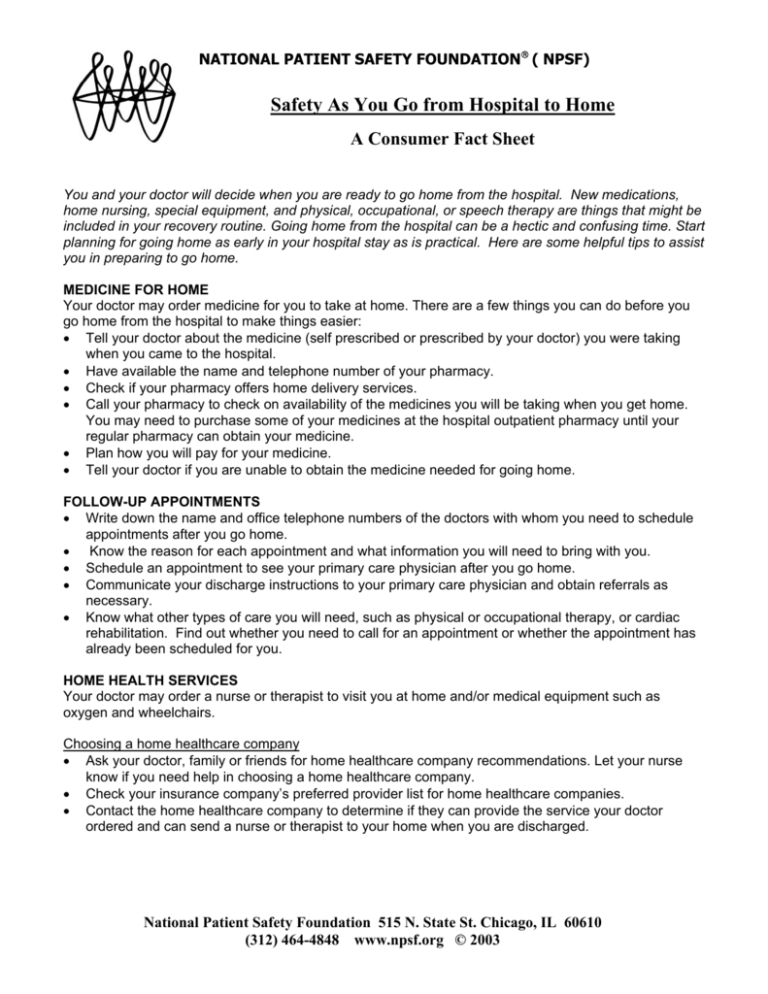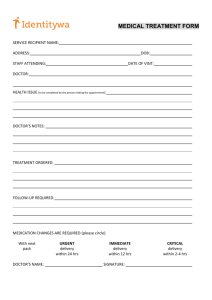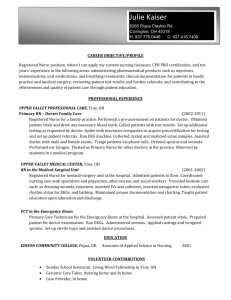national patient safety foundation
advertisement

NATIONAL PATIENT SAFETY FOUNDATION ( NPSF) Safety As You Go from Hospital to Home A Consumer Fact Sheet You and your doctor will decide when you are ready to go home from the hospital. New medications, home nursing, special equipment, and physical, occupational, or speech therapy are things that might be included in your recovery routine. Going home from the hospital can be a hectic and confusing time. Start planning for going home as early in your hospital stay as is practical. Here are some helpful tips to assist you in preparing to go home. MEDICINE FOR HOME Your doctor may order medicine for you to take at home. There are a few things you can do before you go home from the hospital to make things easier: • Tell your doctor about the medicine (self prescribed or prescribed by your doctor) you were taking when you came to the hospital. • Have available the name and telephone number of your pharmacy. • Check if your pharmacy offers home delivery services. • Call your pharmacy to check on availability of the medicines you will be taking when you get home. You may need to purchase some of your medicines at the hospital outpatient pharmacy until your regular pharmacy can obtain your medicine. • Plan how you will pay for your medicine. • Tell your doctor if you are unable to obtain the medicine needed for going home. FOLLOW-UP APPOINTMENTS • Write down the name and office telephone numbers of the doctors with whom you need to schedule appointments after you go home. • Know the reason for each appointment and what information you will need to bring with you. • Schedule an appointment to see your primary care physician after you go home. • Communicate your discharge instructions to your primary care physician and obtain referrals as necessary. • Know what other types of care you will need, such as physical or occupational therapy, or cardiac rehabilitation. Find out whether you need to call for an appointment or whether the appointment has already been scheduled for you. HOME HEALTH SERVICES Your doctor may order a nurse or therapist to visit you at home and/or medical equipment such as oxygen and wheelchairs. Choosing a home healthcare company • Ask your doctor, family or friends for home healthcare company recommendations. Let your nurse know if you need help in choosing a home healthcare company. • Check your insurance company’s preferred provider list for home healthcare companies. • Contact the home healthcare company to determine if they can provide the service your doctor ordered and can send a nurse or therapist to your home when you are discharged. National Patient Safety Foundation 515 N. State St. Chicago, IL 60610 (312) 464-4848 www.npsf.org © 2003 Preparing for home healthcare services before you leave the hospital • Give the home healthcare company your telephone number and the address where you will be staying after you leave the hospital. • Know what home nursing services and/or medical equipment your doctor ordered. • Know when the first home nursing visit is scheduled to begin. • Confirm the time of delivery and delivery address of medical equipment (your hospital room or your home). • Confirm your portable oxygen tank is full before you leave the hospital if applicable. • Make sure your take-home supplies will last until the first home nursing visit. • Obtain the name, telephone number and name of a contact person at the home nursing company. When you arrive home • Call the home healthcare agency to let them know you have arrived at your home. TAKING CARE OF YOURSELF WHEN YOU GET HOME You may need help caring for yourself when you go home from the hospital, particularly with bathing, cooking, cleaning, laundry, grocery shopping and traveling back and forth to the doctor’s office. Typically, you may be weaker than usual and tire more easily when you first come home from the hospital. Family and friends can usually help care for you after you go home from the hospital. Organize a schedule of helpers with your friends and family. Home Environment • Plan to enter your home without climbing steps. If you need to climb steps to enter your home, determine if a neighbor, friend or family member will be routinely available to provide assistance to you. • Plan to make your bedroom on a floor with a bathroom if possible. • Use night-lights in strategic areas to prevent falls at night. • Place the telephone and emergency telephone numbers near you. • Keep hallways, stairways and pathways clear of clutter. • Wear snugly-fitting, non-slip, low heeled shoes or slippers. Everyday activities • Clarify bathing instructions with your doctor (sponge bath, shower, tub bath). • Clarify activity instructions with your doctor (cooking, cleaning, driving). • Ask your doctor if there are specific foods you should eat or avoid eating. • Schedule bathing, grooming and dressing activities when friends or family are present in your home. • Schedule quiet time for yourself. ARRIVING HOME Coming home is a day full of activity and joy. You and your family have been preparing for this day. Reacquaint yourself with your home environment by reviewing the helpful hints mentioned above and your discharge instructions. Enjoy your homecoming. National Patient Safety Foundation - 8405 Greensboro Dr, Ste 800, McLean, VA 22102-5120 2 (703) 506-3280 www.npsf.org © 2003





